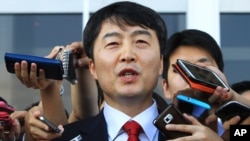SEOUL —
VOA Seoul bureau's Youmi Kim also contributed to this report
On September 4, South Korea's parliament for the first time voted to prosecute one of its lawmakers for allegedly plotting to overthrow the government in favor of North Korea. The lawmaker and the North Koreans are denying the allegation and instead accusing South Korea's spy agency, the National Intelligence Service, of fabricating it for political purposes.
Seoul's National Intelligence Service (NIS) last week arrested Lee Seok-ki and three other members of his Unified Progressive Party for treason and violating the National Security Law.
The NIS alleges they plotted an armed rebellion against their own country in the event of war with North Korea.
South Korean media say the group, known as the Revolutionary Organization, planned to steal weapons and attack oil and communication facilities.
Korea's National Assembly, for the first time, voted to strip Lee of his parliamentary immunity, and the ruling Saenuri party of President Park Geun-hye is calling for his expulsion.
North Korea's state media on Sunday rejected any link between the South Korean lawmaker and Pyongyang, describing the charges as a “farce” to spoil improving relations between the two Koreas.
Paek Do-myoung, chairman of Professors for Democracy, a group advocating democratic reform through education, said the case is historic.
He said there were some cases in the past related to plotting rebellion, but there has never been a case where an incumbent lawmaker was accused of plotting rebellion. Such a case happening these days, he said, seems almost impossible.
It is not the first time that Lee Seok-ki has been arrested for subversion related to North Korea.
A decade ago he was jailed for participating in an underground political party accused of having links with Pyongyang. Lee was sentenced to two and a half years in prison but received a presidential pardon.
His UPP is a small, left-wing party with only six of 298 seats in parliament. But some of its rhetoric leads many to believe they are more than just sympathetic to North Korea.
The party is one of the most outspoken advocates of removing the United States military presence from South Korea, despite the security assurance it provides against possible attacks from the North. And even though Pyongyang routinely threatens Washington and Seoul, Lee has been quoted in South Korean media saying it is the U.S., not North Korea, creating tensions on the peninsula.
However, the South Korean lawmaker denies the rebellion charges.
He said the clock of South Korea’s democracy has stopped as of today...The politics of South Korea is missing, he added, and the politics of the National Intelligence Service has begun. He said his Unified Progressive Party will trust South Korean citizens and strongly fight to protect democracy.
Lee and the UPP accuse the NIS and conservatives of leading a “witch hunt” to distract attention from a scandal over last year's presidential election.
Former director Won Sei-hoon is on trial accused of ordering NIS agents to post comments online against liberal candidates and praising conservative ruling party leader Park Geun-hye, who won the presidency.
Hundreds of Koreans have gathered in recent months for candlelit protests against NIS abuses, and calling for the spy agency to be reformed.
Paek Do-myoung, chairman of Professors for Democracy, a group advocating democratic reform through education, said the fact that the NIS was involved in wrongdoing or illegal activities cannot be denied. Lee’s case happened while people were pointing out the NIS’s wrongdoings. He said the crime of plotting rebellion was applied to Lee, but he is not sure if it really is plotting rebellion. He added that he considers it suspicious whether or not there is a case.
South Korea's spy agency and conservative governments have a history of arresting and punishing left-wing opponents, sometimes in concert, under the pretense of suppressing communism and pro-Pyongyang groups.
South Korea's first president, Syngman Rhee, established the 1948 National Security Law to halt the spread of communism, but also used it to arrest thousands of people, many of them student activists.
The National Security law is criticized for suppressing freedom of speech and association, making it illegal to praise North Korea or contact any of its agents without permission.
South Korea also blocks pro-North Korea websites and arrests distributors of propaganda, including those who re-send links through Twitter.
Defenders of the harsh laws say they are necessary because of the continuing threat posed by North Korea.
Hwang Tae-soon, a political analyst at the Wisdom Center, a think tank in Seoul, said the National Security Law of South Korea is the same as the Patriot Act in the United States. Since South Korea and North Korea stand face to face, he said, South Korea needs a special law for the crimes related to spying, rebellion and incursion.
South Korea has thwarted assassination plots by North Korean agents over the years. In more recent times, the NIS has arrested South Koreans accused of helping the North carry out cyber attacks.
The NIS declined an interview request from VOA saying they are not commenting on Lee's case.
South Korea's main liberal opposition, the Democratic Party, supported removing Lee's immunity. But it also warned conservatives not to turn the case against Lee into a campaign to root out alleged communists.
VOA Seoul bureau's Youmi Kim also contributed to this report









